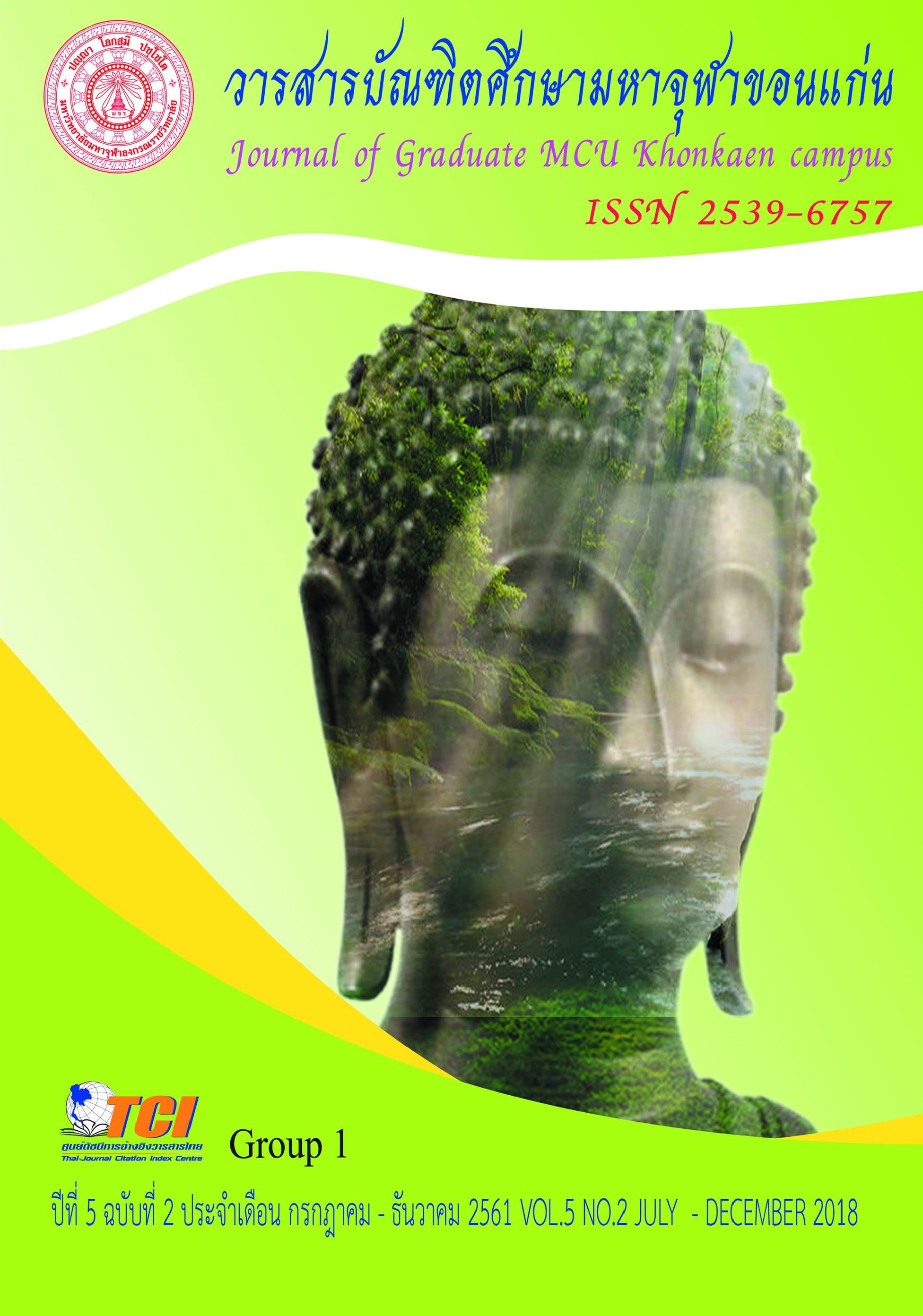การบริหารจัดการเพื่อส่งเสริมสหกรณ์ออมทรัพย์ครูในจังหวัดขอนแก่นของกรมส่งเสริมสหกรณ์ตามแนวคิดการบริหารจัดการที่ยั่งยืน
Main Article Content
บทคัดย่อ
การศึกษาครั้งนี้มีวัตถุประสงค์สำคัญเพื่อศึกษา (1) ปัญหาเกี่ยวกับการบริหารจัดการเพื่อส่งเสริมสหกรณ์ออมทรัพย์ครูในจังหวัดขอนแก่นของกรมส่งเสริมสหกรณ์ตามแนวคิดการบริหารจัดการที่ยั่งยืน (2) แนวทางการปรับปรุงการบริหารจัดการเพื่อส่งเสริมสหกรณ์ออมทรัพย์ครูในจังหวัดขอนแก่นของกรมส่งเสริมสหกรณ์ตามแนวคิดการบริหารจัดการที่ยั่งยืนและ (3) ตัวแบบของแนวทางการปรับปรุงการบริหารจัดการเพื่อส่งเสริมสหกรณ์ออมทรัพย์ครูในจังหวัดขอนแก่นของกรมส่งเสริมสหกรณ์ตามแนวคิดการบริหารจัดการที่ยั่งยืน ทั้งนี้ ได้นำแนวคิดการบริหารจัดการที่ยั่งยืน 7 ด้านมาปรับใช้เป็นกรอบแนวคิดการวิจัยที่สำคัญของการศึกษาครั้งนี้ ทั้ง 7 ด้าน ได้แก่ ด้านเศรษฐกิจ คุณธรรม คุณภาพชีวิต สังคมสิ่งแวดล้อม ความสมดุล และเครือข่าย
ระเบียบวิธีวิจัยของการศึกษาครั้งนี้ ได้ออกแบบรูปแบบการวิจัยให้เป็นวิธีการวิจัยแบบผสมโดยเน้นการวิจัยเชิงปริมาณเป็นหลักและใช้การวิจัยเชิงคุณภาพเป็นข้อมูลเสริม
การวิจัยเชิงปริมาณเป็นการวิจัยเชิงสำรวจเพื่อให้ได้ข้อมูลสนามจากกลุ่มตัวอย่างเป็นจำนวนมาก โดยใช้แบบสอบถามเป็นเครื่องมือในการเก็บรวบรวมข้อมูล แบบสอบถามได้ผ่านการทดสอบเพื่อหาค่าความเที่ยงตรงได้ค่าเท่ากับ 0.94 และผ่านการหาค่าความเชื่อถือได้ ที่ระดับ 0.84 ประชากร คือ สมาชิกสหกรณ์ออมทรัพย์ครูขอนแก่นทั้งหมดในอำเภอเมือง จังหวัดขอนแก่น จำนวน 2,053 คน ส่วนกลุ่มตัวอย่าง คือ สมาชิกสหกรณ์ดังกล่าว จำนวน 1,128 คน ซึ่งได้มาจากการคำนวณโดยใช้สูตรของทาโร่ ยามาเน่การเก็บรวบรวมข้อมูลสนามดำเนินการระหว่างวันที่ 1-30 เมษายน 2561 เก็บรวบรวมแบบสอบถามที่สมบูรณ์กลับคืนมาได้จำนวน 950 ชุด/คน คิดเป็นร้อยละ 84.22 ของกลุ่มตัวอย่างทั้งหมด 1,128 คนสำหรับวิธีวิเคราะห์ข้อมูลเป็นการวิเคราะห์ในรูปตาราง รวมทั้งใช้รูปแบบการวิเคราะห์เชิงพรรณนา ส่วนสถิติที่ใช้ในการวิเคราะห์ข้อมูลเป็นสถิติเชิงพรรณนา ได้แก่ค่าร้อยละ ค่าเฉลี่ยและค่าเบี่ยงเบนมาตรฐาน ในส่วนของการวิจัยเชิงคุณภาพ เป็นการสัมภาษณ์แนวลึกเฉพาะผู้เชี่ยวชาญ จำนวน 12 คน ซึ่งได้มาจากการสุ่มตัวอย่างตามแนวคิดสโนว์บอลล์ และเป็นการสัมภาษณ์แบบตัวต่อตัว คนละไม่น้อยกว่า 60 นาที ด้วยแบบสัมภาษณ์แนวลึกที่มีโครงสร้าง
ผลการศึกษาพบว่า (1) ปัญหาเกี่ยวกับการบริหารจัดการที่สำคัญ คือ กรมส่งเสริมสหกรณ์ส่งเสริมสหกรณ์ออมทรัพย์ครูในจังหวัดขอนแก่นให้นำเทคโนโลยีที่ทันสมัยมาใช้ในการให้บริการสมาชิกของสหกรณ์โดยใช้งบประมาณอย่างไม่ประหยัดเท่าที่ควร (2) แนวทางการปรับปรุงการบริหารจัดการที่สำคัญคือกรมส่งเสริมสหกรณ์ควรส่งเสริมสหกรณ์ออมทรัพย์ครูในจังหวัดขอนแก่นให้นำเทคโนโลยีที่ทันสมัยมาใช้ในการให้บริการสมาชิกสหกรณ์โดยใช้งบประมาณอย่างประหยัด รวมทั้งเผยแพร่การใช้งบประมาณอย่างชัดเจนเพิ่มมากขึ้นด้วยขณะเดียวกัน กรมส่งเสริมสหกรณ์ควรสนับสนุนนักบริหารมืออาชีพ และผู้บริหารที่มีเจตนารมณ์แน่วแน่ในการสนับสนุนให้ใช้เทคโนโลยีและเครือข่ายสังคมที่ทันสมัยเพื่อให้บริการอย่างจริงจังและต่อเนื่องด้วยและ (3) กรมส่งเสริมสหกรณ์ควรสร้างและนำตัวแบบของแนวทางการปรับปรุงการบริหารจัดการเพื่อส่งเสริมสหกรณ์ออมทรัพย์ครูในจังหวัดขอนแก่นของกรมส่งเสริมสหกรณ์ตามแนวคิดการบริหารจัดการที่ยั่งยืนไปปรับใช้เป็นกลุ่มตัวชี้วัดที่สำคัญของการปฏิบัติงาน และนำไปสู่การปฏิบัติอย่างจริงจังและต่อเนื่อง รวมตลอดทั้งนำตัวแบบไปพัฒนาต่อยอดต่อไปในอนาคตอีกด้วย โดยตัวแบบดังกล่าวควรประกอบด้วย 4 ด้าน เรียงตามลำดับความสำคัญจากมากไปน้อย ดังนี้ ด้านเศรษฐกิจ คุณภาพชีวิต คุณธรรม และสังคม
Objectives of this study were mainly to explore (1) problems of administration of the Teacher Savings Cooperative Promotion in KhonKaen Province of the Cooperative Promotion Department according to the Sustainable Administration Concept, (2) improvement guidelines of administration of the Teacher Savings Cooperative Promotion in KhonKaen Province of the Cooperative Promotion Department according to the Sustainable Administration Concept, and (3) model of improvement guidelines of administration of the Teacher Savings Cooperative Promotion in KhonKaen Province of the Cooperative Promotion Department according to the Sustainable Administration Concept. The Sustainable Administration Concept of 7 aspects: Economy, Morality, Quality of life, Society, Environment, Balance, and Network, was applied as major conceptual framework of this study.
Methodology of this research was designed the research design as mixed methods research applying quantitative research as a principal and qualitative research as a supplementary. The quantitative research was survey research collecting large field datafrom samples with questionnaires. The questionnaires passed try out of validity check at level of 0.94 and reliability check at level of 0.84. Population was all 2,053cooperative members of the Teacher Savings Cooperative inMuang District of KhonKaen Province. Sampling size was 1,128 cooperative members calculated by using Taro Yamane’s formula. Field data collection was operated during April 1-30, 2018, and total of 950 completed sets of questionnaire, equal to 84.22% of the 1,128 total samples, were returned. Data analysis was presented in contingency table with descriptive approach. Descriptive Statistics exercised were percentage, mean, and standard deviation. For qualitative data, in-depth interview of 12 experts, selected by the Snowball Sampling Concept with face to face interview of at least 60 minute each and structured in-depth interview form, was also applied.
Findings of this research were(1) the main problem was the Cooperative Promotion Department' s promotion the Teacher Savings Cooperative in KhonKaen Province on modern technology adoption for services of cooperative members by spending budget uneconomically, (2) the main improvement guidelines of administration werethe Cooperative Promotion Department should promote the Teacher Savings Cooperative in KhonKaen Province on modern technology adoption for services of cooperative membersby spending budget economically and disseminating of the budget spending explicitly and increasingly. By the same time, the Cooperative Promotion Department should seriously and continuously support the professional executives including executive with steady intentions of favoring the uses of modern technology and social network for services, and (3) the Cooperative Promotion Department should create and apply the model of improvement guidelines of administration to promote the Teacher Savings Cooperative in KhonKaen Province of the Cooperative Promotion Department according to the Sustainable Administration Concept as the Key Performance Indicators and implement practically and continuously. Further developmentof the model should also be done. The model should consist of 4 aspects arranging from the most importance to the least as follows: Economy, Quality of life, Morality, and Society.
Article Details
เอกสารอ้างอิง
Ronna C. Turner and Laurie Carlson. (2003). Indexes of Item-Objective Congruence for Multidimensional Items, International. Journal of Testing, 3(2), 163-171. Rowland Atkinson and John Flint. (2001). Accessing Hidden and Hard-to Reach Populations : Snowball Research Strategies.Social Research Update, Department of Sociology, University of Surrey, United Kingdom. Smith, J. A. (2011). Evaluating the contribution of interpretative phenomenological analysis. Health Psychology Review, 5(1), 9-27. Wiruchnipawan, W. (2016). 50 Concepts, Indicators, Models of Management And sustainable management. Bangkok : Fourpence Press. Wiruchnipawan, W. (2017). The ability to manage using modern technology and social networks to serve the people of the municipality in SamutPrakan province according to the concept of PANT-ITERMS. Journal of Management and Technology, Eastern University, 14(1), 234-248. Yamane, Taro. (1967). Statistics : An Introductory Analysis. (3rd ed.). New York : Harper & Row.

